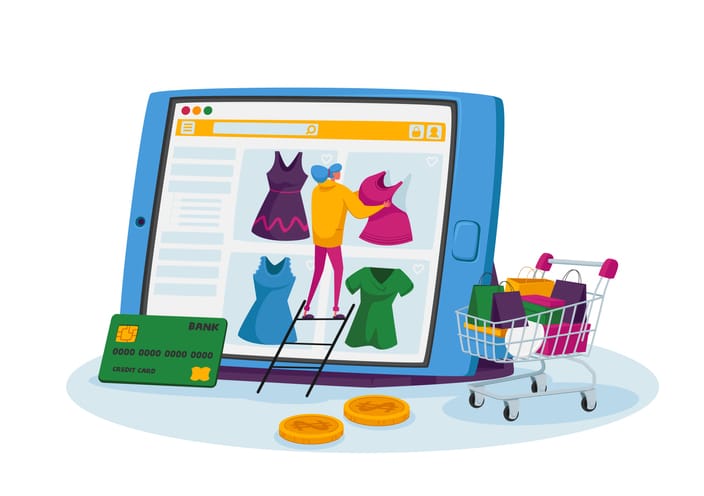Differences between using Shopify vs BigCommerce for an eCommerce Website

This article was published on August 23, 2015
Categorized in: Digital Marketing
Choosing the right eCommerce platform for your business can be a daunting task. This blog post will compare Shopify and BigCommerce and highlight the differences between the two platforms. So, whether you are just starting or looking to switch platforms, this blog post is for you!
Ease of Use
One of the main reasons businesses choose Shopify is that it is so easy to use. Shopify was designed with small business owners in mind, and it is very user-friendly. It is a cloud-based platform, which means you can access it anywhere with an internet connection.
In contrast, BigCommerce is more complex and may require some technical knowledge to use. The good news is that BigCommerce offers many resources to help you get started, including video tutorials and support from their team of experts.
Pricing
Shopify is more affordable than BigCommerce. There are three pricing plans available with Shopify, and the most expensive plan costs $299 per month. With this, you get access to all of the features of Shopify, including unlimited products and bandwidth, 24/7 support, and a free SSL certificate.
The BigCommerce pricing plans start at $29.95 per month and go up to $299.95 per month. This plan does not include some of the features available with Shopify, such as unlimited products and bandwidth, 24/7 support, and a free SSL certificate. However, BigCommerce does offer a $79.95 per month plan that includes all of the features of Shopify.
Features
Shopify and BigCommerce offer a wide range of features, but there are some differences between the two platforms. For example, Shopify offers a point-of-sale system, which allows you to process payments in person. Also, Shopify will enable you to create custom checkout pages, giving your business a more professional appearance.
BigCommerce does not offer a point-of-sale system, but it does have a lot of features that are not available with Shopify, such as the ability to create product bundles and gift cards. Also, BigCommerce allows you to sell on Amazon and eBay, which Shopify does not.
Design
Shopify has a wide range of templates to choose from, and you can also create your custom template. The templates are all mobile responsive to look great on any device. They are also straightforward to customize, so you can make them look exactly the way you want.
BigCommerce also has a wide range of templates to choose from, and you can also create your custom template. You can edit the HTML and CSS to change the template’s look and functions. However, the templates are not as mobile responsive as Shopify’s. Also, they are not as easy to customize as the templates available with Shopify.
Customer Support
Shopify and BigCommerce both offer excellent customer support. Shopify has a team of experts who are available 24/7 to help you with any questions or problems you may have. They also have a vast knowledge base and video tutorials to help you get started. You can also access support from other Shopify users in the Shopify community.
BigCommerce also offers excellent customer support. They have a team of experts who are available 24/7 to help you with any questions or problems. The customer support team is also very knowledgeable and can help you set up your account to create a custom product. You can also access support from other BigCommerce users in the BigCommerce community.
Transaction Fees
Shopify does not charge any transaction fees, so you will only pay the processing fees charged by your credit card company. This means that you will keep more of the profits from your sales.
BigCommerce charges a transaction fee for each sale. This fee is 2.9% plus $0.30 per order. This means that you will have to pay a little more for each sale. However, BigCommerce offers a lower processing fee of 2.9% plus $0.25 per order.
Sale Limits
Shopify does not have any sale limits, so you can sell as much as you want. It also has a speedy checkout process, which means that you will not lose any sales because of slow page loads.
BigCommerce has sale limits of $50,000 per month. This may be too low for some businesses. However, BigCommerce offers a higher sale limit of $200,000 per month for companies approved by their team.
Both Shopify and BigCommerce offer great features and excellent customer support. However, there are some differences between the two platforms that you should consider before choosing which one to use. Shopify is a little more expensive than BigCommerce, but it offers a broader range of features and is very easy to use.
BigCommerce is cheaper than Shopify, but it does not provide as many features, and the templates are not as mobile responsive. Whichever platform you choose, you can be sure that you will create a great eCommerce website that will help your business succeed.
LIKE AND SHARE THIS ARTICLE:
About the Author: Brick Marketing President, Nick Stamoulis
 Nick Stamoulis is President of Brick Marketing and has over 25 years of digital marketing experience. He works directly with clients on strategy and implementation, helping solve complex challenges through SEO, AI Search Optimziation (GEO), content marketing, social media, PPC, and conversion optimization. Nick Stamoulis has worked with over 500 companies across virtually every B2B industry and also provides digital marketing consulting and training classes, helping companies improve performance and achieve the digital marketing outcomes they are looking for.
Nick Stamoulis is President of Brick Marketing and has over 25 years of digital marketing experience. He works directly with clients on strategy and implementation, helping solve complex challenges through SEO, AI Search Optimziation (GEO), content marketing, social media, PPC, and conversion optimization. Nick Stamoulis has worked with over 500 companies across virtually every B2B industry and also provides digital marketing consulting and training classes, helping companies improve performance and achieve the digital marketing outcomes they are looking for.




